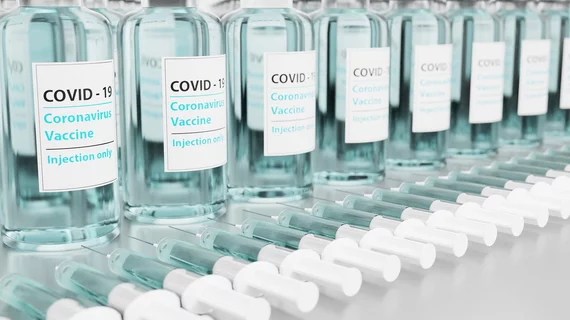Moderna sues Pfizer, BioNTech over COVID-19 vaccine patent
Moderna Inc. has filed patent infringement lawsuits against COVID-19 vaccine makers Pfizer and BioNTech over its mRNA technology in the vaccine.
Pfizer and BioNTech are the makers of one of three COVID-19 vaccines approved for market in the United States by the Food and Drug Administration under emergency use authorization. According to Moderna, the Pfizer-BioNTech COVID-19 vaccine Comirnaty violates patents filed by Moderna between 2010 and 2016 that covered the company’s mRNA technology. Moderna alleges Pfizer and BioNTech copied this technology to make the Comirnaty vaccine, while Moderna claims the tech was critical to the development of its own COVID-19 vaccine, Spikevax.
Specifically, Moderna alleges Pfizer and BioNTech stole two key features of Moderna’s patents, and that both companies did not have the level of mRNA expertise for developing vaccines against infectious diseases as Moderna when the Pfizer-BioNTech vaccine came out. Pfizer and BioNTech also pursued four vaccine candidates in clinical trials before proceeding with an mRNA vaccine with “the same exact mRNA chemical modification to its vaccine as Spikevax,” Moderna alleges. The vaccine approach that Pfizer and BioNTech took was first used by Moderna when it developed a vaccine for Middle East Respiratory Syndrome (MERS) years prior to the emergence of COVID-19.
"We are filing these lawsuits to protect the innovative mRNA technology platform that we pioneered, invested billions of dollars in creating, and patented during the decade preceding the COVID-19 pandemic," Moderna CEO Stéphane Bancel said in a statement. "This foundational platform, which we began building in 2010, along with our patented work on coronaviruses in 2015 and 2016, enabled us to produce a safe and highly effective COVID-19 vaccine in record time after the pandemic struck.”
Moderna noted that it did not file lawsuits over the COVID-19-related patents “while the pandemic continued.” Moderna announced its lawsuits Friday, Aug. 26, 2022. However, by all accounts, the pandemic is not over.
According to the COVID-19 tracker from the Centers for Disease Control and Prevention (CDC), the U.S. is currently averaging more than 90,000 new cases of COVID-19 daily, with more than 5,300 hospitalizations and 389 new deaths daily. More than 1 million people have died of COVID-19 in the U.S. since the onset of the pandemic, and the virus became a leading cause of death this year, behind heart disease and cancer. Just under 80% of the U.S. population has received at least one dose of a COVID-19 vaccine, while only 67.4% are fully vaccinated, according to the CDC.
Moderna stated that, as of March 2022, the pandemic entered a new phase where vaccine supply was no longer a barrier to access in many parts of the world. At that point, Moderna decided to change its pledge not to pursue its patent lawsuits. Moderna, a giant in the pharmaceutical industry, stated Pfizer and BioNTech should respect its intellectual property and that it would consider a commercially reasonable license should they request one for other markets. Moderna said it would not enforce its patents in low- and middle-income countries.
The lawsuit comes as Moderna intends to use its mRNA technology for future vaccine candidates.
“As we work to combat health challenges moving forward, Moderna is using our mRNA technology platform to develop medicines that could treat and prevent infectious diseases like influenza and HIV, as well as autoimmune and cardiovascular diseases and rare forms of cancer,” Bancel said.
Notably, Moderna is not seeking the removal of the Pfizer-BioNTech COIVD-19 vaccine from the market, nor an injunction for its future sale. The pharma company is seeking damages for activities after March 8, 2022, in markets where Pfizer and BioNTech would be responsible.
News of Moderna’s lawsuits comes the same day Pfizer and BioNTech have completed their submission to the European Medicines Agency for a booster dose of the BA.4/BA.5 COVID-19 variant. That booster also leverages mRNA technology.

